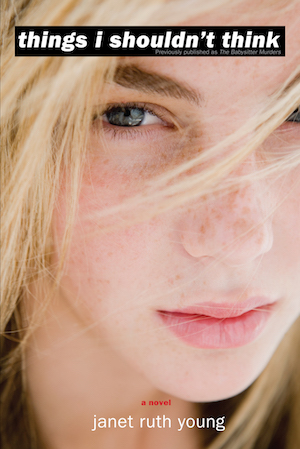Note: This book was previously published as The Babysitter Murders.
 Things I Shouldn't Think • contains 327 pages • published 26. July 2011 • read as paperback • shelve on Goodreads
Things I Shouldn't Think • contains 327 pages • published 26. July 2011 • read as paperback • shelve on Goodreads • shelve on The StoryGraph
Synopsis:
Everyone has disturbing thoughts sometimes. But for seventeen-year-old Dani Solomon, strange thoughts have taken over her life. She loves Alex, the little boy she babysits, more than anything. Then one day she envisions harming him. The images are so gruesome, she can’t get them out of her mind. In fact, Dani’s worried that she might actually kill Alex. So she confesses her thoughts to keep him safe—and consequently sets off a media frenzy that makes “Dani Death” the target of an extremist vigilante group. Through the help of a daring psychiatrist, Dani begins to heal her broken mind. But will it be too late? The people of her community want justice... and Dani’s learning that some thoughts are better left unsaid.
Easy but Engaging to Read
I could not put this book down. I had to know what would happen next. I wanted to know how Dani would come to deal with her thoughts, if she would be able to overcome them, and how. The chapters of Things I Shouldn’t Think were markedly short, so it was easy to fly past the pages.
Dealing with Dark Thoughts
Dani has very dark and disturbing thoughts. She pictures herself harming others and fears that her thoughts will eventually lead to her actually acting upon them. What unsettles her most are her thoughts about stabbing Alex with knives lying around the house. Alex is just a child. He can’t defend himself if Dani really does harm him. That’s when she decides that to protect him she must stop babysitting. The only way out is to tell his mother.
Once she tells his mother, word spreads quickly in the small town. Dani faces judgement from people around her for crimes she didn’t even commit. Parents are on high alert, afraid that that a murderer may be on the loose. Dani is not a violent person but instead suffers from obsessive compulsive disorder. This is a tale about mental illness and the response to it as a result of ignorance towards it.
Things I Shouldn’t Think is an Epistolary Novel
Aside from just writing from the third-person perspective, Young also included newspaper articles, opinion pieces, editorials, TV transcripts, blog posts and comments, social networking profiles and conversations from chat rooms. I think this approach to Things I Shouldn’t Think is a good reflection of the world today. People’s opinions are shaped and influenced by the media and other popular opinion. Fear-mongering is a common tactic employed on the Internet and Young thus dealt with the dangers of misinformation. One fitting quote from a newspaper editorial was:
“[C]uriosity does not equal the right to know.”
From there I thought that the responsibility of the media was well explored. Also, the resultant responses and speculations that arose were poignant: the newspaper was afraid of being sued, bribery was at play, the journalists were incompetent and lacked information, etc. Sentiments like these are all too common and can lead to detrimental responses due to lack of proper understanding of the situation at hand.
Worth Reading though Could’ve Gone Deeper
With that, I think the premise of Things I Shouldn’t Think alone is good reason to read it. Beyond this however, I think that some areas could have been better explored. As much as Dani’s OCD was presented in terms of the symptoms and ways to deal with it, other aspects of the plot were grossly neglected.
Shelley, Dani’s best friend, came out to her. Shelley’s homosexuality should not have taken such a backseat. Yes, we see her struggle and try to come to terms with possible opposition. But what about her parents? They are described as vehement opposers to homosexuality. But Shelley’s concerns on how she would identify herself in front of her parents were not even mentioned once.
Then there was Malcolm. An observer from afar. He knew things before others did. He became an important figure in the story, yet his deal is nowhere explained properly. He was more than misguided in his actions and I believe, far more disturbed than Dani but somehow even that was undermined.
Surely Shelley’s and Malcom’s backgrounds could have been explored a little more. In the end I thought it was a little myopic to focus so much on Dani at the expense of these other two characters with rather significant issues. I’m sure that would have been possible without necessarily undermining the main issue of Dani’s OCD.
